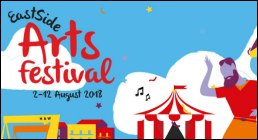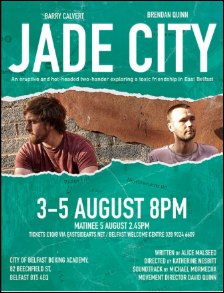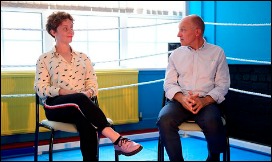
This is the first of two blogs on festival events this summer.

The focus of today’s blog is a play, “Jade City”, which the Commission sponsored at this year’s Eastside Festival. The invited audience stood in a corridor in a former primary school, now a boxing club, in East Belfast, where the two header play started. After a few minutes we were invited into a small former classroom, where we took our seats around a boxing ring, the stage for the 60 minute play, written by Alice Malseed, who herself boxes and trains at the club.
In short, over the 60 minutes we get a stark insight into the lives of two young (30 year old) East Belfast, Protestant, working class men, Monty and Sas. The tight, real-life dialogue raised sensitive issues including mental health, education, sexual violence, substance and alcohol abuse, sectarianism and suicide. It was a hard and graphic engagement.
After the play ended and a five minute break, about half of the original audience came back for a 30 minute Q and A session with the writer and myself.
The writer, Alice, explained why she wrote the piece and what she hoped it would achieve. It was not saying that poverty automatically delivers a range of social problems, or that sectarianism and violence against women is the sole preserve of working class communities. It was simply a play set in that context, reflecting lived realities.
The audience reacted well to the opportunity to question Alice and make personal observations about the issues raised by Sas and Monty. We reflected on educational under attainment, poor mental health, received community narratives about “the other”, limited aspirations, male fantasies, and suicide as a potential escape-route to pressures felt by many young men.
As someone who grew up less than a mile from the venue, I had many moments when I was alongside the actors, recognising from my past the well written local geographies, pressures and views of “the other”.

I was challenged by the common threads raised by the play and the questions which read across into the Commission’s priorities on the need for equality in education, for addressing mental health and housing need and the fact that poverty is a condition that has disproportionate impact on how people live with enduring inequalities. This was not a play that raised the common cultural issues connected with flags and parades, although they were there in the back story. It was, rather, a statement of how people survive in very difficult circumstances and why there needs to be high level interventions at an early age to ensure good educational opportunities and safe and affordable housing which can create and nuture positive citizenship and strong self esteem.
So, now what? Well the Commission is in the course of developing our strategic plan for the next 3 years with agreed priorities – of which addressing enduring educational inequalities remains a key. It will be vital that as we work towards outcome based accountability, our success measures the impact our work has on improving the future life chances of young men like Sas and Monty. It is also vital we continue to have our work moulded and informed by their voices and experiences.
Posted on 20 Aug 2018 by
Dr Michael Wardlow